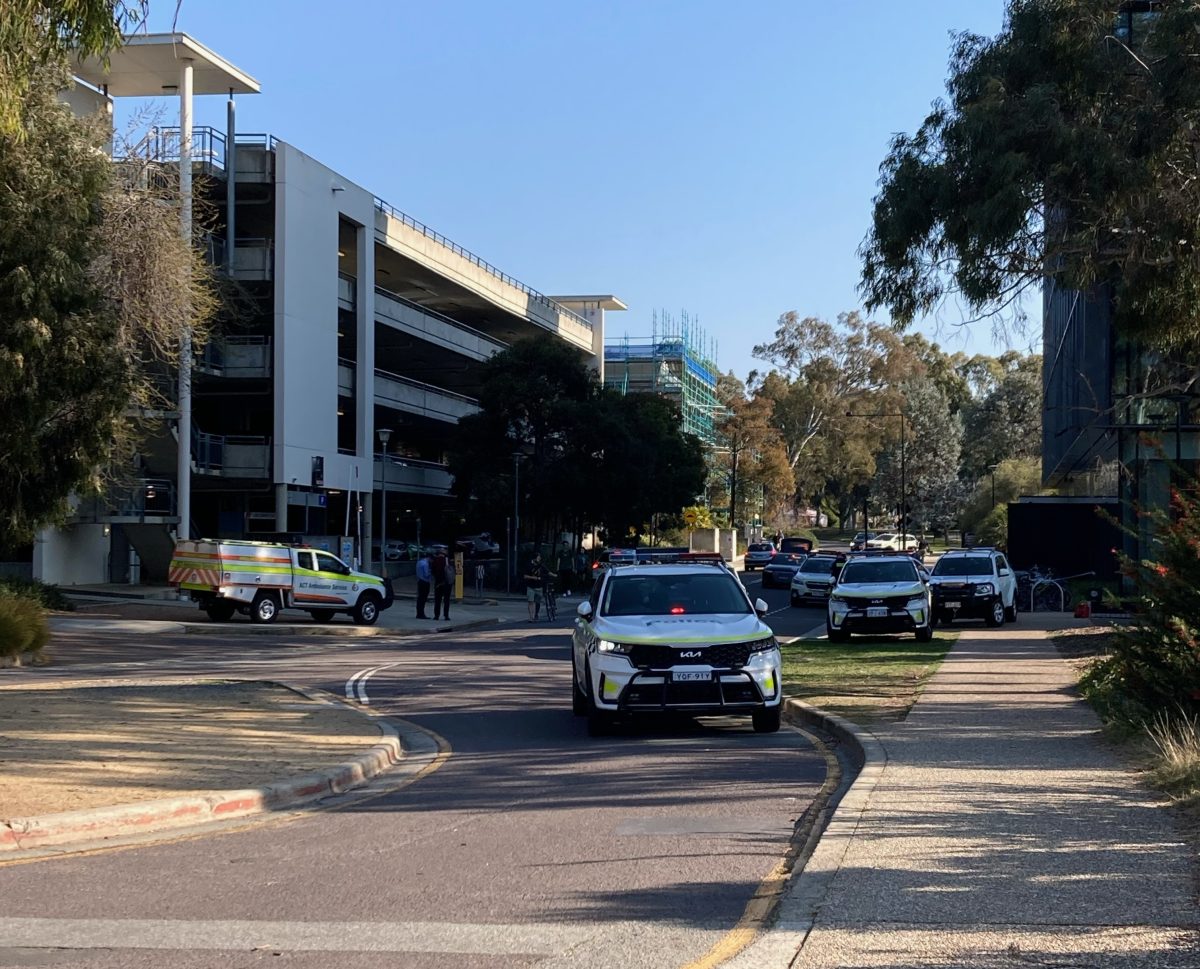
ACT Policing officers on scene during the alleged ANU incident on 18 September. Photo: Joanne Griffiths.
The ACT Administrative and Civil Tribunal (ACAT) doesn’t have to consider prior offending when deciding what type of mental health order a person should receive after a court has found them not guilty by way of mental impairment, a review has revealed.
The Chief Psychiatrist’s report looking at care for people found not guilty because of mental impairment was ordered after a man who had been granted day leave from a mental health facility allegedly attacked four people at the ANU in September 2023.
The accused, Alex Leonard Ophel, was previously found not guilty of five counts of attempted murder because of mental impairment over a 2017 incident and had been under the care of Gawanggal Mental Health Unit in 2023.
He’s been charged over the more recent incident and remains before the courts.
A clinical review of Mr Ophel’s care and treatment at the time has also been prepared but hasn’t been released due to existing ACT legislation, including the Health Records (Privacy and Access) Act 1997 and Health Act 1993.
The overarching public review made 35 recommendations, predominately in regard to legislation, identifying a number of key areas where wording could impact what type of order a person receives and what kind of day leave they receive.
ACAT is the body in charge of deciding what kind of mental health orders (if any) may be imposed on a person found not guilty by mental impairment.
It can order a Forensic Mental Health Order (FMHO), Mental Health Order (MHO) or Conditional Release Order (CRO).
ACAT can only impose an FMHO or MHO under strict criteria and must consider if, on reasonable grounds, it’s thought the person is likely to do serious harm to themselves or someone else.
“This places a high bar for assessing risk. There must be a likelihood of a person’s health or safety being substantially at risk, or of the person doing serious harm to others,” the report noted.
“That test is not apt to capture the circumstance where there is an unacceptable risk (lower than a likelihood) of serious harm eventuating.”

Alex Leonard Ophel has been accused of being behind the alleged attack at the ANU and is before the courts. Photo: YouTube.
As for making a CRO (which can include a person’s release from custody into a secure mental health facility), the Mental Health Act doesn’t expressly include factors relating to the offence or offences that the person was accused of committing.
“There is no requirement that ACAT consider the nature and circumstances of the offence with which the accused is charged,” the report noted.
The Chief Psychiatrist recommended that it be changed and that ACAT should consider the “psychopathology and other criminogenic factors” that contributed to a person’s offending by way of a forensic psychiatric report.
He also wanted wording cleared up so that the risk of serious harm to others was inclusive of risk to the safety of the community.
In relation to CROs, the report stated its purpose was to ensure conditions or restrictions were put in place to minimise the risk of the person to themselves, others and the community.
“Conditions imposed on the person to even proceed on leave are stringent and several layers of approvals are necessary for the person who wishes to leave the facility to actually leave,” it noted.
When people take unauthorised leave, escape or abscond, both Dhulwa and Gawanggal have to follow the Dhulwa Escape and Abscond Procedure.
This document couldn’t be found, with the Chief Psychiatrist relying on Canberra Health Service’s Missing Patient Procedure instead.
Different types of day leave include escorted (with/without mechanical restraints, with mental health staff or a responsible person) or unescorted, and can also include conditions around medication, geographical restrictions and length of time. Leave can be granted on an ongoing basis or a one-off.
The report acknowledged Mr Ophel had been at the Gawanggal Mental Health Unit at the time of the alleged incident.
Gawanggal is considered to be a ‘step-down’ inpatient unit from Dhulwa and is intended to function as a rehabilitation unit to support people with mental health illnesses to transition to living in the community.
But the report also noted people who have been found not guilty because of mental impairment are “often required to reside at the most secure mental health facility” in the ACT.
“[This is] because the person is considered to have an underlying psychopathology that, if left unsupervised or untreated, may present risk to the person, others and the general community,” it stated.


















